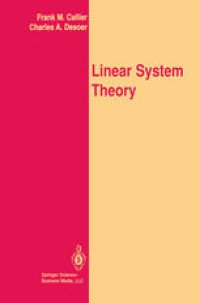
Ebook: Linear System Theory
- Tags: Electrical Engineering, Appl.Mathematics/Computational Methods of Engineering, Systems Theory Control, Calculus of Variations and Optimal Control, Optimization
- Series: Springer Texts in Electrical Engineering
- Year: 1991
- Publisher: Springer-Verlag New York
- Edition: 1
- Language: English
- pdf
This book is the result of our teaching over the years an undergraduate course on Linear Optimal Systems to applied mathematicians and a first-year graduate course on Linear Systems to engineers. The contents of the book bear the strong influence of the great advances in the field and of its enormous literature. However, we made no attempt to have a complete coverage. Our motivation was to write a book on linear systems that covers finite dimensional linear systems, always keeping in mind the main purpose of engineering and applied science, which is to analyze, design, and improve the performance of phy sical systems. Hence we discuss the effect of small nonlinearities, and of perturbations of feedback. It is our on the data; we face robustness issues and discuss the properties hope that the book will be a useful reference for a first-year graduate student. We assume that a typical reader with an engineering background will have gone through the conventional undergraduate single-input single-output linear systems course; an elementary course in control is not indispensable but may be useful for motivation. For readers from a mathematical curriculum we require only familiarity with techniques of linear algebra and of ordinary differential equations.
This volume is intended for engineers in research and development and applied mathematicians. It is also designed to be a useful reference for graduate students in linear systems with interests in control. With this purpose in mind, the discrete-time case is treated in an isomorphic fashion with the continuous-time case. This volume is self-contained: four mathematical appendices develop the many specialized mathematical results needed in the main text. In the development of Linear System Theory emphasis is placed on careful and precise exposition of fundamental concepts and results.
The main topics of Linear System Theory are treated systematically: the dynamics of linear time-varying and time-invariant systems; stability; controllability and observability; realizations; linear feedback and estimation; linear quadratic optimal control; finally, the last chapter develops the main results of unity-feedback MIMO systems. At various suitable places basic computational issues and robustness issues are discussed.
This volume is intended for engineers in research and development and applied mathematicians. It is also designed to be a useful reference for graduate students in linear systems with interests in control. With this purpose in mind, the discrete-time case is treated in an isomorphic fashion with the continuous-time case. This volume is self-contained: four mathematical appendices develop the many specialized mathematical results needed in the main text. In the development of Linear System Theory emphasis is placed on careful and precise exposition of fundamental concepts and results.
The main topics of Linear System Theory are treated systematically: the dynamics of linear time-varying and time-invariant systems; stability; controllability and observability; realizations; linear feedback and estimation; linear quadratic optimal control; finally, the last chapter develops the main results of unity-feedback MIMO systems. At various suitable places basic computational issues and robustness issues are discussed.
Content:
Front Matter....Pages i-xiv
Introduction....Pages 1-4
The System Representation R(·) =[A(·), B(·), C(·), D(·)]....Pages 5-54
The Discrete-Time System RepresentationR d (·)=[A(·),B(·),C(·),D(·)]....Pages 55-67
The System RepresentationR =[A,B,C,D], Part I....Pages 68-94
The Discrete-Time System Representation R d=[A,B,C,D]....Pages 95-102
The System Representation R=[A,B,C,D], Part II....Pages 103-139
General System Concepts....Pages 140-159
Sampled Data Systems....Pages 160-172
Stability....Pages 173-203
Stability: The Discrete-Time Case....Pages 204-221
Controllability and Observability....Pages 222-264
Controllability and Observability. The Discrete-Time Case....Pages 265-294
Realization Theory....Pages 295-314
Linear State Feedback and Estimation....Pages 315-355
Unity Feedback Systems....Pages 356-402
Back Matter....Pages 403-509
This volume is intended for engineers in research and development and applied mathematicians. It is also designed to be a useful reference for graduate students in linear systems with interests in control. With this purpose in mind, the discrete-time case is treated in an isomorphic fashion with the continuous-time case. This volume is self-contained: four mathematical appendices develop the many specialized mathematical results needed in the main text. In the development of Linear System Theory emphasis is placed on careful and precise exposition of fundamental concepts and results.
The main topics of Linear System Theory are treated systematically: the dynamics of linear time-varying and time-invariant systems; stability; controllability and observability; realizations; linear feedback and estimation; linear quadratic optimal control; finally, the last chapter develops the main results of unity-feedback MIMO systems. At various suitable places basic computational issues and robustness issues are discussed.
Content:
Front Matter....Pages i-xiv
Introduction....Pages 1-4
The System Representation R(·) =[A(·), B(·), C(·), D(·)]....Pages 5-54
The Discrete-Time System RepresentationR d (·)=[A(·),B(·),C(·),D(·)]....Pages 55-67
The System RepresentationR =[A,B,C,D], Part I....Pages 68-94
The Discrete-Time System Representation R d=[A,B,C,D]....Pages 95-102
The System Representation R=[A,B,C,D], Part II....Pages 103-139
General System Concepts....Pages 140-159
Sampled Data Systems....Pages 160-172
Stability....Pages 173-203
Stability: The Discrete-Time Case....Pages 204-221
Controllability and Observability....Pages 222-264
Controllability and Observability. The Discrete-Time Case....Pages 265-294
Realization Theory....Pages 295-314
Linear State Feedback and Estimation....Pages 315-355
Unity Feedback Systems....Pages 356-402
Back Matter....Pages 403-509
....